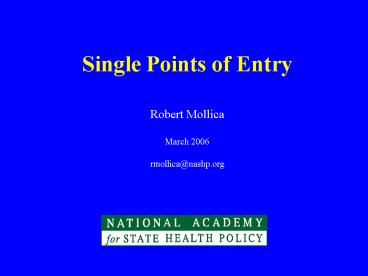Single Points of Entry PowerPoint PPT Presentation
Title: Single Points of Entry
1
Single Points of Entry
- Robert Mollica
- March 2006
- rmollica_at_nashp.org
2
Overview
- Balancing long term supports systems
- Single points of entry
- Considerations
3
The SPE context
- SPEs are one of several key components of long
term support systems that affect choice balance - Others
- Funding streams
- Budget mechanisms
- Eligibility process
- Nursing home supply strategies
- Full array of services
4
Medicaid spending balance (billions) FY 2004
All groups Elderly, adults with disabilities,
MR/DD
5
Percent by population group
6
Medicaid Spending Balance 2004 Elders and adults
with disabilities
Includes HCBS waiver, state plan personal care
and home health. Does not include some state plan
services, state general revenue, OAA and other
programs
7
Balance in the neighborhoodElders and adults
with disabilities
8
Improving the balance in Michigan How long will
it take?
9
Measures of balance
- Percentage spending on HCBS, NF
- Percentage of people served in community settings
- Participants days or days of coverage
10
Balancing strategies
- Single long term care budget (OR, MD, WA)
- Access PA Community Choices
- Money Follows the Person (TX, MD, IN)
- Options counseling (NJ)
- Nursing home transition (NJ, WA, MA)
11
PA Community Choices
- Access to assessment 24/7
- Services within 12 to 72 hours
- Reduce financial application (12 to 5 pages) and
functional assessment (27 to 5 pages) - Disregard 6,000 in assets
- Self-declaration of income and assets
- Presumptive eligibility
12
Washington NF caseload trends
Figures for July each year
13
Washington HCBS trends
Figures for July each year
14
Washington LTC Spending trends (millions)
Based on data from the Washington Aging and
Disability Services Administration
15
Key SPE questions
- What is SPE? One stop? No wrong door?
- A place, a web based process or both?
- For whom?
- For what?
- Who does it?
- How much does one organization offer?
- Aging and Disability Resource Centers
- Full or split functions?
16
ADRC role
- Provide information and assistance to public and
private-pay individuals - Entry point to publicly administered long term
supports - Target individuals at imminent risk of admission
to an institution by creating linkages with the
pathways to long-term care
Greg Case, AoA, 3/3/04
17
Key access features
- Planting the seed - awareness of resources
- Information readily available when the need
arises - Access vs referrals
- Streamlined assessment, clinical and financial
eligibility - Virtual gateway using the internet
18
Comprehensive system selected features
- Philosophy, leadership
- Comprehensive entry points/one stop
- Financing that supports access and choice
- Full array of services
- Nursing home case management and relocation
assistance - Streamlined access
19
Impact of a comprehensive system
Reduces Medicaid growth trend line
NF reliance
Broad array
Time
20
Information access array of services
choice, better balance
21
Comprehensive entry points
- What is entry?
- A system that enables consumers to access long
term and supportive services through one agency
or organization - 42 CEPs in 32 states and DC
NASHP 2003
22
CEP functions
- Information referral
- Assistance
- Web based IA
- Initial screening
- NF screening or options counseling
- Assessment
- Financial eligibility
- Functional eligibility
- Develop care plan
- Authorize service
- Monitor services
- Reassessment
- Protective services
23
Michigan SPE functions
- Planning and collaboration
- Outreach, education and advocacy
- Information and assistance
- Person centered planning (care plan)
- Facilitator
- Options counseling
24
Michigan SPE
- Program or service transitions
- Supports coordination (authorization)
- Function/medical eligibility determination
- Facilitate financial eligibility decision
- Ongoing coordination
25
SPE examples
- Colorado
- Connecticut (CBOs)
- Illinois (CCUs)
- Indiana (AAAs)
- Kansas (AAAs)
- Maine (split)
- Massachusetts (ASAPs/AAAs)
- Minnesota (Counties)
- Oregon (County AAA, state field offices)
- Pennsylvania (AAAs)
- Vermont (split)
- Washington (split)
- Wisconsin (Counties)
26
Populations served
NASHP 2003
27
Funding sources
NASHP 2003
28
Organizations
NASHP 2003
29
Split system - Vermont
- DAIL (state agency) reviews referral information
and determines clinical eligibility - May make a home visit
- Decides level of need (highest, high, moderate)
- Reviews service options with the applicant
- Sends information to selected CMA (AAA or HHA)
- CMA completes assessment, develops care plan
- DAIL reviews the plan of care
30
Split system - Washington
- Aging and Disability Services Administration
staff complete all assessments - Determine clinical and financial eligibility
- Review service options
- Develop initial care plan
- Provide CM for consumers in nursing homes and
residential settings - AAAs provide ongoing CM for in-home clients
31
Discussion
- What does SPE mean to you?
- What functions should an SPE perform?
- What components of the current system should be
kept in a SPE system? - What linkages will be needed between community
providers, physicians and SPEs?

